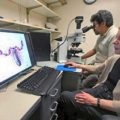
Evaluating the impact of livestock antibiotics on the environment, University of Minnesota researchers have found that many vegetables uptake the antibiotics. The study, in the Journal of Environmental Quality, shows that food crops can readily accumulate antibiotics from soils spread with cattle manure.
The findings were based on a greenhouse study involving three food crops: corn, lettuce, and potatoes. The plants were grown in soil modified with liquid hog manure containing sulfamethazine, a commonly used veterinary antibiotic. The researchers found that the antibiotic was taken up by all three crops.
The antibiotic was found in the plant leaves and concentrations in the plant tissue increased as the amount of antibiotic present in the manure increased. Worryingly, it also diffused into potato tubers, which suggests that other root crops – such as carrots and radishes – may be particularly vulnerable to antibiotic contamination.
While the USDA stipulates that organic producers must manage animal materials in a manner that does not contribute to contamination of crops by residues of prohibited substances, manures containing antibiotics are not formally banned or prohibited. Dolliver concluded that further research is needed to investigate how different plants absorb different antibiotic compounds.
Related articles:
Prevalence Of Antibiotic Resistance Surprises
Prof Ponders Bacterial Benefits
Down On The Farm: Yields, Nutrients And Soil Quality
Increasing Soil Erosion Threatens World’s Food Supply


















Comments are closed.